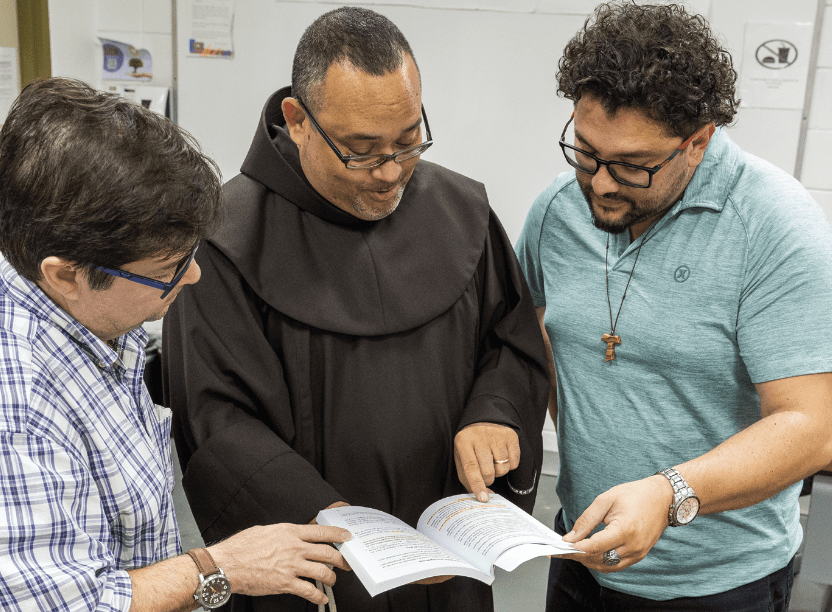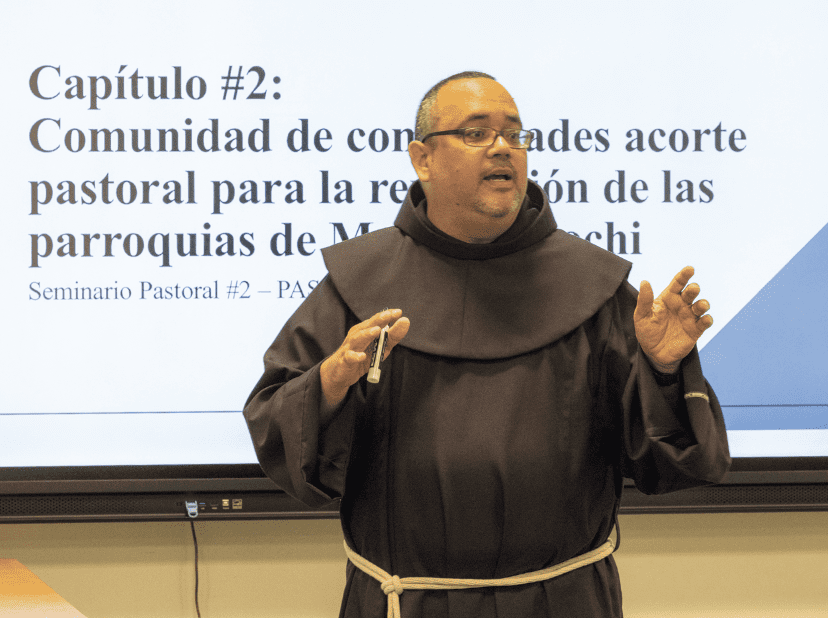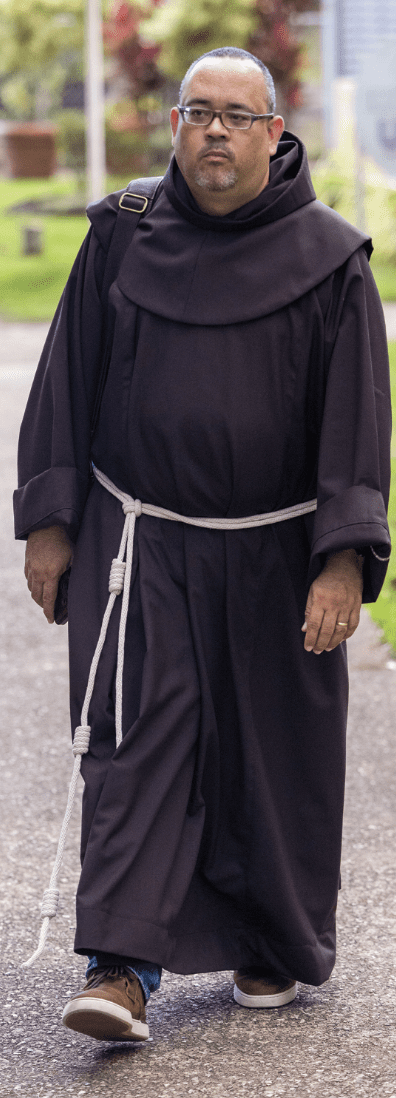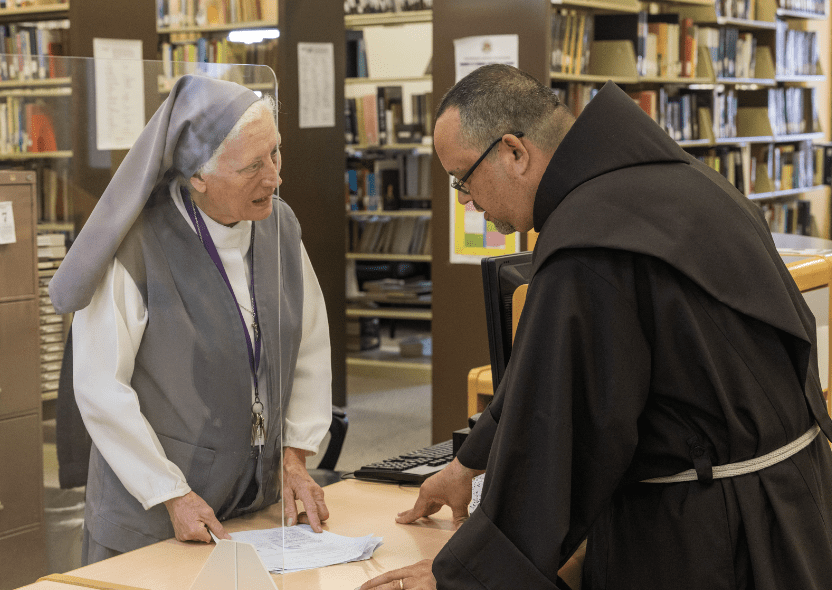Featured In The Franciscan Way Magazine: Spring 2025

Photography by Octavio Duran, OFM
Whether delivering thought-provoking lectures or providing spiritual guidance, Father Gerardo embodies the perfect balance between intellectual rigor and compassionate leadership. His unwavering commitment to education and his profound understanding of the human spirit make him a true beacon of hope and inspiration for all who cross his path.
As a child, little Gerardo dreamed of becoming a priest. At a family gathering, he announced, “I’m going to be a priest.” Then he ran off to hide, shy but determined. Although he didn’t go to Mass daily, his vocation was born in that magical moment of serving God.
Fray Gerardo Vargas, OFM, recalls a Saturday afternoon from his childhood. He was about seven years old and riding his bicycle through his neighborhood in Lajas, a small municipality in southwestern Puerto Rico, an area with a beautiful natural reserve where he spent a happy childhood.
Upon seeing a lady sitting with some children in front of the Santa Rosa de Lima chapel, which belongs to the Nuestra Señora de la Candelaria parish, he stopped his bicycle. “Come in to have a drink and eat a sandwich,” the lady told him.
“And if there’s food and I’m invited, I go,” says the 49-year-old Franciscan friar, smiling as he describes the moment. “The following Saturday, I was invited, and I stayed for catechesis.” With that distinctive Puerto Rican joy, the friar describes, through his childhood memories, the moments that led him to a religious vocation.
When he began the catechesis, his sister was 16, and his brother was 18. His two older siblings were born in Elizabeth, New Jersey, but when Gerardo was born in 1976, his parents had already returned to live on the Island of Enchantment.
“My parents have passed away: my father, Félix Antonio Vargas Mercado, in 2013 and my mother, Rosa María Cruz Rodríguez, just a year ago. I come from a middle-class family. My dad worked in the private sector, and my mom was an employee in school cafeterias,” says Fray Gerardo. “I grew up in a very family-oriented environment, a neighborhood where there were many children.”

Father Gerardo describes his family as “very normal,” even religiously. “My dad wasn’t one to go to Mass every Sunday. The one who had a very strong faith was my grandmother, Felicita Mercado,” he says, while describing a Puerto Rican tradition that is fading, that of the rezadores, people who went to community wakes to pray the rosary for the deceased. “That was my paternal grandmother, a rezadora. She was a very small woman, about five feet tall. In a week she would have been in four different houses, praying rosaries for the deceased,” says Father Gerardo. “My mom was the rezadora in my grandmother’s novena, and upon my grandmother’s passing, my mom took on that role in the community. And so that tradition arose in the family, which I also inherited for a short time while I was in college.” As a child, the friar stayed at his grandmother’s house while his parents went to work.
“I remember seeing my grandma get up early and open her book of prayers. She didn’t recite just two prayers; no, she spent an hour praying and then started her work. I think that somehow influenced my life,” he says.
He wanted to become a priest
“I was at home with my parents, and there were family and friends talking about who would get married and who wouldn’t when we grew up. I said, ‘I will be a father, but not of children; rather, of the church.’ Then I ran off and hid behind some trash cans,” says the priest. “Much later, I became an altar boy.”
“We went to church, but not every day, so I don’t know why that came up.” During the catechesis period, Fray Gerardo remembers going to a bookstore, San Germán, with his mother, who liked to listen to religious music. “I bought a little book, ‘The Imitation of Christ,’ which I didn’t read. There was a pamphlet called ‘I Want to Be a Priest,’ and I do remember reading that one. I really enjoyed reading ‘Lives of the Saints’; I found it interesting. Maybe that marked something within me.”
Once, he accompanied his mother to Mass. She brought a translated missal with which young Gerardo followed the ritual of the Mass. “I was marking with a pencil what the priest said. And at the moment of consecration, I drew some hands above the word; that was so when I played at celebrating Mass, I would know what I had to do.”
After his first Communion, Gerardo joined the youth groups at the parish and continued with them after his confirmation. He always had a vocational restlessness, but he was also quite in love. His friends often asked him why he wanted to be a friar.
Participating in the parish developed a social consciousness in him: “A group of young people and I would dress as clowns for birthdays. We didn’t charge; whatever people gave us, we donated to the parish or to someone in need. It was like a kind of pastoral work.”

In the 1990s, seminarians from the Diocese of Mayagüez visited his parish to promote vocations. Gerardo was about 14 when he began visiting the Mayagüez Seminary.
Father Gerardo reflects that he may have been attracted to the liturgical elements: “The incense, the songs, all that mystical element of the altar. I saw the priests, serious, upright, maybe I wanted to be like them. It wasn’t that I wanted to be a priest to visit the sick or to be a missionary. At that time, I didn’t know what a missionary was.”
Gerardo realized his calling at the Festival of Love, a vocational fair organized by the Dominican Sisters of Fatima, where he met the Franciscan friars.
“These people take vows of poverty, but I want to have my car, my house — I want to have everything. I don’t want to be a friar,” Gerardo thought. “But I was struck by their way of being, their naturalness. I see these friars in sandals, habits, laughing, playing guitar, discussing normal topics. And I said a phrase, ‘This is what I want. This is what I’m looking for,’ which I later found in reading a little book about St. Francis.”

When he went to the first Franciscan vocational meeting by the beach, Gerardo thought, “This can’t be normal. Religious people at the beach, playing basketball, singing at night. But I discovered that was part of my life. I’m someone who likes to share, talk about everything, likes to be myself, with or without the habit – I’ll be the same.”
He joined the friars, and that was 28 years ago, he says. “And every day I ask myself, ‘Lord, is this really what you want for me?’ That’s my vocation. It’s not like a light came down from heaven and illuminated me, or that I was born with this as a child. I think it’s been a path of questions, and the Lord has answered them little by little.”
Friar Gerardo Antonio Vargas Cruz, OFM, was born on December 2, 1976. He studied at public schools, and when he entered the Franciscan order, he did his postulancy and novitiate in Santo Domingo. He professed his first vows on July 19, 1997, then returned to Puerto Rico for his philosophical and theological training, earning a degree in social work. He professed solemn vows in 2004 and was ordained a priest in 2006.
Since then, he has served as master of postulants, parish priest, parochial vicar, Caribbean vice-custos and custos, vocation promoter, master of the simply professed, bursar and guardian.
For six years, Father Gerardo lived in a Franciscan friary, where he helped start the Children of New Hope project, which assists families and kids from disadvantaged communities.
He’s worked in Cuba, the Dominican Republic and Puerto Rico. These days, he’s the episcopal vicar for priests in the Archdiocese of San Juan, a professor at the University of Bayamón, and one of the Franciscan animators for the Province of Our Lady of Guadalupe’s mission in Puerto Rico.
As a friar on that mission, Father Gerardo is concerned about the vocations crisis. Not a single Puerto Rican Franciscan has been ordained in the 18 years since his own ordination.
As a university professor he cares about the ethical and spiritual formation of students, developing pastoral practices as an advisor for the School of Theology and Ministry. And as the vicar for archdiocesan priests, he looks after the spiritual wellbeing of nearly 100 diocesan priests across the 143 parishes.
How does he manage all those responsibilities? “I grew up in parcelas (small plots given to families for housing). I tell people I’m proudly a ‘parcela priest.’ It’s my origin, and I can’t pretend to be something different,” Father Gerardo says. “When I feel my ego rising, I take off my shoes and walk barefoot, so I never forget I come from a neighborhood and that my parents were workers.”
What’s the greatest joy of being a Franciscan brother? “When I hear someone thank me because I’ve given them back hope,” he says. “Knowing that, as a friar, I’ve been able to change lives and show a more human, closer face of the church.” That’s what he wants, what he seeks.
